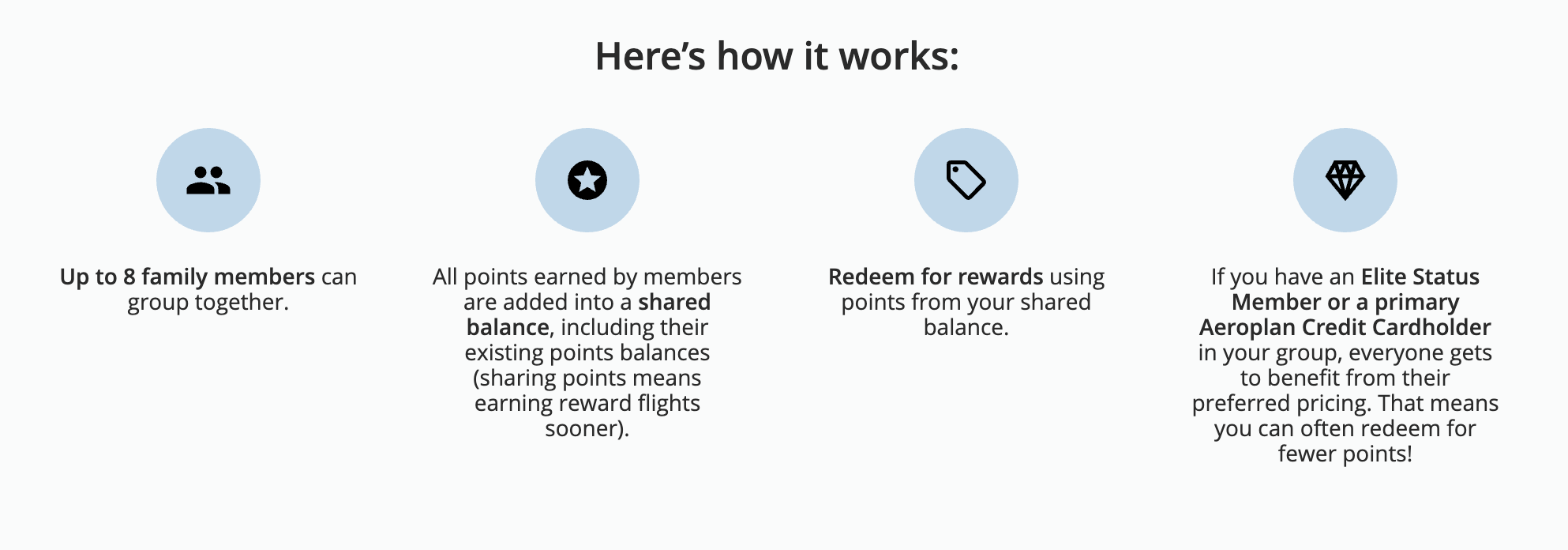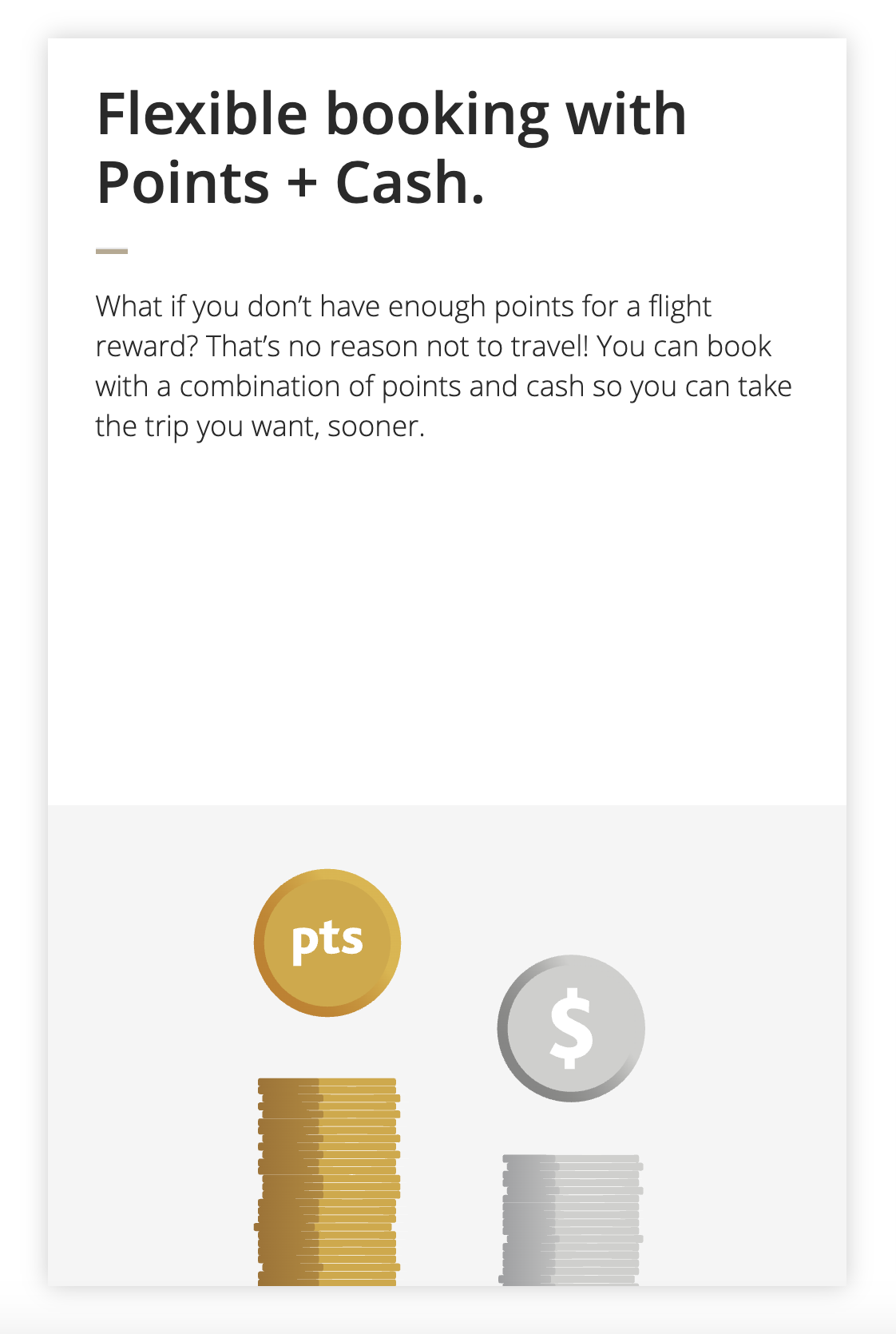What an exciting day it’s been.
I hope you’ve had some time to absorb all of the key details about the new Aeroplan loyalty program, our in-depth analysis on the new flight rewards, and our discussion of the new co-branded credit cards that are about to arrive on the Canadian market.
I wanted to dedicate this post to exploring a quartet of exciting new features that will play key roles in the new Aeroplan experience as of its November 8 relaunch.
While a few of these features take inspiration from other well-run loyalty programs out there, and others are true pioneers in that they’ve never been seen before among any global program, all four features ultimately serve to deliver greater value, flexibility, and recognition to Aeroplan members.
1. Family Sharing
Aeroplan’s new Family Sharing feature will make it significantly easier for families and households to pool their points together, earn and redeem as a unit, and leverage their Aeroplan points to achieve their travel dreams sooner.
You can watch this video by Air Canada to get an understanding of how the Family Sharing feature will work, and then we’ll go through the full details below.
Every Family Sharing group (we’ll call it “Family” for short) can include up to eight members. Any Aeroplan member can initiate the process of setting up a Family by inputting the Aeroplan number and name of any member they’d like to invite to the group.
During the invitation process, the member will be asked to list their relationship to the invitee: parent, sibling, child, cousin, etc. You can also select “Other” as a catch-all option, as the Family Sharing feature is really more about forming groups with trusted contacts with whom you’d like to pool your points, rather than strictly keeping it within family members.
The initiator and manager of a Family also has the ability to lock and unlock each Family member’s ability to redeem points out of the shared pool. For example, this might make sense if you’re a parent who’s pooling your child’s points together with your own – you wouldn’t want your child curiously logging in one day and blowing the family’s hard-earned points on an Etihad Apartments flight for themselves.
After you’ve sent out an invitation, the invitee will receive an email letting them know that they’ve been invited to a Family Sharing group. They can either accept or decline the invitation.
Once the invitation is accepted, the new Family member’s points balance instantly pools into the collective Family’s points balance. All of their future earnings will enter the pooled points balance as well.
Family Sharing groups also allow for the sharing of certain benefits: for example, if one member of the Family has Aeroplan Elite Status or holds a co-branded credit card, thereby benefiting from preferred pricing on Air Canada flights as part of the dynamic pricing model, then everyone else in the Family will benefit from preferred pricing as well.
However, the most interesting part of Family Sharing is how it works on the redemption side. Whenever a Family member redeems Aeroplan points, there is no ability to designate whether those points are deducted from their own points balance or another Family member’s points balance. Instead, the points will come out of all Family members’ balances, and will be deducted proportionally to everyone’s respective points balances.
Let’s use an example to illustrate. Suppose that Alice, Bob, Charlie, and Devon form a Family Sharing group. After a few months of earning Aeroplan points, their balances sit at 100,000, 75,000, 25,000 and 300,000 Aeroplan points, respectively. (Devon likes to compulsively shop on the Aeroplan eStore, even though she can’t afford what she’s buying.)
Therefore, the collective points balance for the Family is 500,000 Aeroplan points. Alice and Bob now decide to treat themselves to a pair of EVA Air business class tickets, which they book between Vancouver and Taipei for 75,000 Aeroplan points each.
Even though Alice and Bob both have enough points on their own to cover the 75,000 Aeroplan points, that’s not how the points get deducted.
Instead, Aeroplan calculates that Alice, Bob, Charlie, and Devon’s points balances each represent 20%, 15%, 5%, and 60% of the overall collective balance; therefore, those percentages are applied to the redemption amount of 150,000 Aeroplan points to determine how many points are deducted from each Family member’s account.
- 20% of 150,000 miles is 30,000 miles, which is deducted from Alice’s account, leaving her with 100,000 – 30,000 = 70,000 miles
- 15% of 150,000 miles is 22,500 miles, which is deducted from Bob account, leaving him with 75,000 – 22,500 = 52,500 miles
- 5% of 150,000 miles is 7,500 miles, which is deducted from Charlie’s account, leaving him with25,000 – 7,500 = 17,500 miles
- 60% of 150,000 miles is 90,000 miles, which is deducted from Devon’s account, leaving her with 30,000 – 90,000 = 210,000 miles
As you can see, Charlie and Devon effectively subsidized Alice and Bob’s tickets, because everyone’s in the same Family. Clearly, trust and transparency will be paramount among those you choose to add to your Family Sharing group.
Speaking of trust, Aeroplan is putting a great deal of trust in their members to use the Family Sharing feature in good faith. Unlike some other loyalty programs out there, Aeroplan will not ask for proof of familial relations, nor will there be a requirement that everyone in the Family have the same address, or anything like that.
Instead, there are a few measures put in place to thwart the “rich distant uncles” out there who might have any unscrupulous ideas.
Once a member joins a Family, they must remain in that Family for at least three months. And if a member of a Family chooses to exit the group after that three-month period, they are not allowed to join another Family Sharing group for a period of six months.
Overall, I’m delighted that Aeroplan has introduced the Family Sharing feature, as it’ll greatly streamline the experience of earning and redeeming points in two-player mode.
Instead of surreptitiously attaching your Aeroplan number to your spouse’s TD credit card or linking each other’s Amex MR accounts back and forth, now you just need to set up a Family Sharing account to pool all your points together!
2. Points + Cash
The next new feature that we’ll take a look at is Points + Cash, inspired by the much-acclaimed Cash & Points payment option in the old Starwood Preferred Guest hotel loyalty program.
Whenever you’re booking an Aeroplan reward, once you’ve selected the itinerary that you want at a price point that you’re happy with, you’ll have the option to pay for the redemption in one of four different ways:
- Regular number of Aeroplan points + regular cash component
- All Aeroplan points + $0 in cash
- 60% of the regular number of Aeroplan points + 40% of the points component converted to cash + regular cash component
- Some variable component between 60–100% of the regular number of Aeroplan points + the remaining 0–40% of the points component converted to cash + regular cash component
The first option is just the standard redemption option that we’re all accustomed to: you pay the number of points required, along with a cash component that consists of the taxes and fees on the award, as well as any other fees that may be applicable ($39 partner booking fee, $30 phone booking fee, infant award fee, etc.) – but thankfully no more carrier-imposed surcharges!
The second option allows you to pay for the whole thing using your Aeroplan points and spend $0 out-of-pocket. Now, technically the current Aeroplan already offers this feature, but the value in redeeming points this way (0.7 cents per mile, or 0.7cpp) is so poor that it’s never recommended to do so.
The third and fourth options go in the opposite direction: you’ll be able to pay only a portion of the number of points required and make up for it by paying a higher cash component. The lowest possible proportion of the points requirement is 60%, with the remaining 40% converted into a cash value; there will also be a mixed portfolio that varies between 60% and 100% that acts as the fourth and final option.
The next question very naturally comes to mind. At what value will Aeroplan points be converted to cash in either direction under the Points + Cash feature?
The answer is that these valuations will vary based on “a number of different parameters”, likely including factors such as the type of redemption, the regular amount of points required, and Air Canada’s own valuation of their Aeroplan currency at any given moment in time.
However, I can say that a sample set of valuations for the Points + Cash feature might be as follows:
- 1cpp when exchanging points for cash
- 2cpp when exchanging cash for points
So, for a given redemption of 12,500 Aeroplan points + $40 in taxes and fees, the option to pay for everything in points might be priced at 16,500 Aeroplan points, while the option to pay for 60% in points and 40% in cash might be 7,500 Aeroplan points + $140 in taxes, fees, and the cash component.
Again, this is only one sample of the Points + Cash pricing that I saw when learning about the feature, so I’m by no means saying that the new program will launch with these Points + Cash valuations in place. However, I wouldn’t expect the valuations to deviate too far from that, and Air Canada has at least confirmed that the value in using Points + Cash will be much better than the abysmal 0.7cpp for topping-up an award under the current Aeroplan.
Ultimately, the “true” redemption cost will probably represent the best value in most situations, as it’s not really a great deal to effectively sell Aeroplan points around 1cpp or buy them around 2cpp.
However, Points + Cash can be immensely helpful for those situations when you don’t have enough points to book the full award, but would be happy to top-up the difference using cash in order to secure a booking anyway.
3. Priority Rewards
Priority Rewards have been one of the many benefits and privileges handed out to Air Canada Altitude elite members; however, Altitude members have long complained about struggling to derive value out of the Priority Rewards benefit unless they were a Super Elite 100K member.
With Altitude being rebranded as Aeroplan Elite Status, Priority Rewards are getting a makeover as well. In the new Aeroplan, Priority Reward vouchers will be redeemable for an incredible 50% points discount on any eligible flight redemption at the time of booking.
If you’re booking a flight reward that costs 25,000 Aeroplan points, then you’ll only pay 12,500 Aeroplan points if you redeem a Priority Reward. If the regular price is 60,000 Aeroplan points, you’ll only pay 30,000 points, and so on.
You can watch this video by Air Canada to get an understanding of how the Priority Rewards feature will work, and then we’ll go through the full details below.
How do you earn Priority Rewards? Beginning January 1, 2021, Priority Rewards will be linked to how many Status Qualification Dollars (SQD) you are able to rack up during each calendar year. One Priority Reward voucher will be awarded at the thresholds of 4,000, 7,000, 10,000 and 15,000 SQD, as well as every 5,000 SQD subsequently, up to a maximum of 50,000 SQD (for a total of 11 Priority Reward vouchers for the year).
Before 2021, however, Aeroplan 35K members and above will also receive Priority Rewards as of the program launch on November 8, which they can redeem immediately.
The number of Priority Rewards you receive on November 8 will be the greater of:
- A flat amount of vouchers: 1 for Aeroplan 35K, 2 for Aeroplan 50K, 3 for Aeroplan 75K, and 4 for Aeroplan Super Elite; or
- The number of vouchers you would earn through the above-listed Priority Rewards thresholds based on 2020 SQD earned through November 8. In light of the impact of COVID-19, as a bonus, your SQD will be doubled when determining your maximum threshold.
- In January 2021, Air Canada will double-check your year-end 2020 SQD balance and deposit any additional Priority Reward vouchers in line with your total balance, based on the policy above.
- For example, if an Aeroplan 50K member has 4,000 SQD on November 8, they will receive 2 Priority Reward vouchers in their account. Should the same member end 2020 with 5,250 SQD, they will receive an additional Priority Reward voucher in January 2021, as they will have crossed the 10,000 SQD Priority Rewards threshold (based on the doubled SQD amount).
If you don’t plan on doing much flying with Air Canada in the rest of 2020 and don’t expect to rack up too many SQDs, then you can expect to receive the flat amount of Priority Rewards vouchers as of November 8: 1 for Aeroplan 35K, 2 for Aeroplan 50K, 3 for Aeroplan 75K, and 4 for Aeroplan Super Elite.
Now let’s talk about the fun part: redeeming your Priority Rewards. The set of eligible flights on which you can redeem a Priority Reward voucher depends on your Aeroplan Elite Status:
- Aeroplan 25K and 35K members will be able to redeem Priority Rewards on economy class flights within Canada and the US
- Aeroplan 50K members members will be able to redeem Priority Rewards on economy class or premium economy flights within all of North America
- Aeroplan 75K members will be able to redeem Priority Rewards on economy class or premium economy flights worldwide
- Aeroplan Super Elite members will be able to redeem Priority Rewards on economy class, premium economy, or business class flights worldwide
As you can see, the most valuable usage of Priority Rewards is reserved for top-tier Super Elite members, who are able to redeem their vouchers towards 50% off business class tickets, while the rest of us are stuck with getting 50% off premium economy at most.
Unfortunately but understandably, no one will be able to redeem a Priority Reward for 50% off a First Class redemption – that would be too generous.
Note that each Priority Reward is valid for one ticket for one passenger. Therefore, if you’re booking a trip for multiple passengers, you’ll need multiple Priority Rewards to cover everyone’s tickets (although you can always redeem only one Priority Reward to get 50% off one passenger’s redemption).
However, the “one ticket” rule gets very interesting when you think back to the fact that a single ticket can consist of multiple one-way fare bounds under the new Aeroplan rewards structure.
In my in-depth analysis on Aeroplan’s new flight rewards, I mentioned that a single ticket can consist of up to six one-way “directions” and 16 flight segments. If you wanted to maximize your savings – and your travel – using Priority Rewards, you’d redeem them on a ticket in which you’ve pieced together as many one-way directions on the same ticket as possible!
And best of all, if you were an Aeroplan 50K member or above (and are therefore eligible to use Priority Rewards outside of Canada and the US), you’d be able to add a stopover on each of those one-way segments for 5,000 Aeroplan points apiece – but really, it’d only be 2,500 Aeroplan apiece with your Priority Reward voucher in action!
4. Status Pass
Finally, let’s talk about the new Status Pass feature, which allows Aeroplan 50K, 75K, and Super Elite members to bestow their elite privileges upon friends, family members, loved ones, or colleagues, even when they aren’t travelling together.
When redeeming a Status Pass, members will be asked to input their designated beneficiary’s Aeroplan member, who will then be notified that they have received a Status Pass nomination. The beneficiary will then be able to redeem the Status Pass on one of their Air Canada journeys, enjoying all of the original member’s Air Canada benefits along the way.
Not only that, but if the Status Pass recipient chooses to redeem it on a ticket shared with up to nine other passengers, then all of those passengers will receive the same benefits as well!
These benefits include priority check-in, security clearance, boarding, baggage handling (for up to three checked bags), standby, and upgrades, as well as Air Canada Maple Leaf Lounge access prior to their flight. Unfortunately, the Star Alliance Gold benefits of 50K, 75K, and Super Elite members are not shared with the Status Pass nominee.
Starting in March 2021, Aeroplan 50K, 75K and Super Elite Members will be able to choose Status Pass as one of their Select Benefits, upon which they will receiving two, three, and four Status Passes respectively. In addition, Aeroplan 50K, 75K and Super Elite Members will all receive one extra Status Pass as a special launch bonus when the benefit is formally introduced at the start of 2021.
Conclusion
Aeroplan has introduced us to four key new features that we can expect when the program is relaunched on November 8, all of which promise to deliver added layers of value and flexibility to Aeroplan members as they earn and redeem points for travel.
Family Sharing will make life much smoother for those of you playing the game in two-player mode or more and accelerate your household’s progress towards the next big reward. And when it comes time to redeem, Points + Cash will allow for more versatile combinations of Aeroplan points and cash co-pays to suit your needs.
Meanwhile, Priority Rewards and Status Pass will handsomely reward the Aeroplan members who worked hard to earn their higher-tier status levels, through a blanket 50% discount on eligible redemptions and the ability to share elite privileges with your loved ones, respectively.
I’m sure they’ll both prove to be a hit among the upper crust of the newly-minted Aeroplan Elite Status program, and I look forward to trying them out for myself!



















Hi Ricky,
Thanks for the thorough explanation. Une question: can you convert Aeroplan points to hotel points, like Marriott or Hilton or others of the such?
Thanks!
Unfortunately, nope. You can convert Marriott or Hilton points to Aeroplan, but not the other way around.
Thank you Ricky! I’m trying to determine how many 50% vouchers I would receive now and/or in January being a Super Elite 100k and 6k SQD as of now?
Ricky,
Do you know if the Priority Awards are earned as a family or individually under the new family accounts? For example, if a family has a 25k member who earns 2 awards due to their CC spending, but the family has another member who is 100k, are the awards earned at the 25k or 100k level?
Individually. The only Elite Status perk that’s shared among a Family Sharing group is the preferred pricing on dynamic AC awards.
Also, note that you do not earn Priority Rewards on credit card spending. It’s based on Status Qualifying Dollars (SQD), which is your spending with Air Canada.
Ricky,
Thank you so much for your very detailed info. I am not sure if seat selection is no longer free for a reward ticket in the lowest fare category under new Aeroplan?
Ricky, do you know if the 50% voucher applies to the 5K stopover fee as well ?
Yes it does! It applies to the entire points cost of any given award.
Thanks ! Follow up question can a stopover be within NA on a Atlantic-NA flight example, MLE-AUH-YYZ (STOP) – LAX ? If so do you know if you would be able to adjust date of last segment post starting the trip ? Would make for a great “tag on” trip.
Update: Turns out, no, your stopover cannot be within Canada/US even on itineraries that go outside of Canada/US. So unfortunately this angle is a no-go. Bright idea though.
Yes, I see no reason why this plan wouldn’t be viable. You’d just pay the associated change fees, stopover fee of 5,000 points, etc., but if you were already in the top distance band then you may as well not let the ability to add a stopover go to waste.
I’m glad we’re already thinking of creative sweet spots!
Must’ve taken a lot of dedication to write all these articles in a single day. Really appreciate the work you are putting into this. It’ll be interesting to see how SQDs and Priority Rewards will play a factor in “bonus hunting” since Priority Rewards encourages card holders to continue using the card after the MSR. I think it’ll depend on how the SUB will be for the Aeroplan cards.
Man, you won’t believe how many Adderalls I’ve popped to write 17,000+ words in one morning.
Just kidding, Air Canada gave a media briefing a few weeks back so we could cover this deluge of information properly. 🙂
“The second option allows you to pay for the whole thing using your Aeroplan points and spend $0 out-of-pocket. Now, technically the current Aeroplan already offers this feature, but the value in redeeming points this way (3 cents per mile, or 3cpp) is so poor that it’s never recommended to do so.”
3cpp isn’t bad value.
But I don’t think that’s accurate.
DP:
I just looked up a flight. $104.50 in taxes and fee, with the option to pay 14,928 miles to cover it.
That represents approx 0.7cpp!
Yes sorry, I’ve gotten my numbers mixed up here, as I was thinking about the poor default value in the opposite direction (trading cash for points).
Lots of content to cover. Some slip-ups. My apologies. That’s why I appreciate all of you 🙂
So if I’m understanding the redemption model correctly, there’s probably some interesting options to book Flex Economy flights using the priority rewards and then immediately use eUpgrade credits to bump the flight to business. That might make them a little more useful for the sub-Super Elite members.